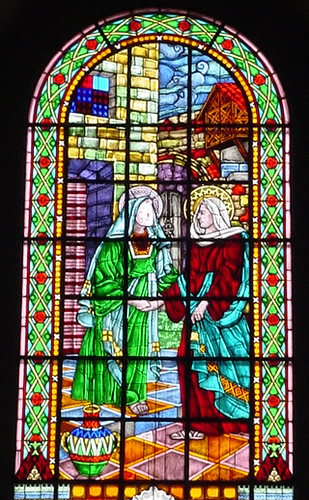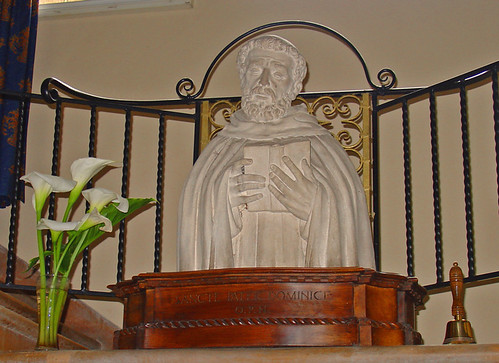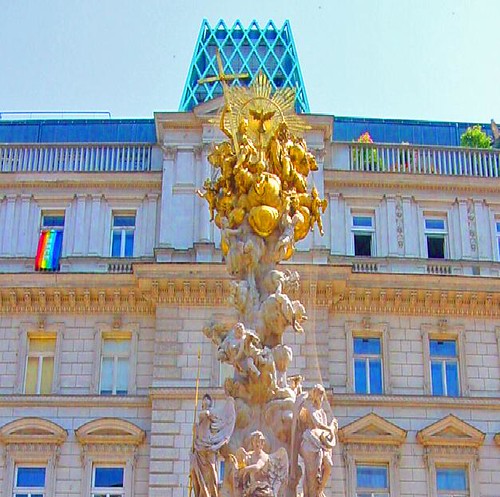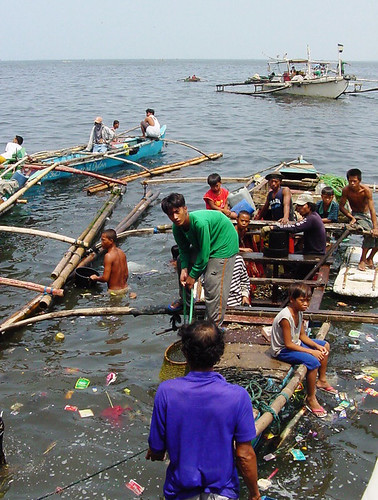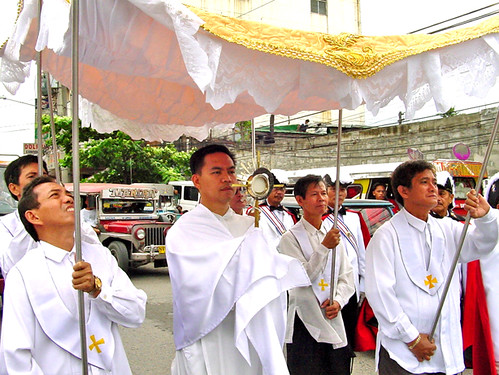
The Servant of God, Pope John Paul the Great, in what would prove to be his last Apostolic Letter to the Church, called Christians everywhere to mark this year as the 'Year of the Eucharist'; calling "the whole Church to contemplate, praise, and adore in a special way this ineffable Sacrament"(
Mane nobiscum Domine, 29). This would have a natural culmination on the
Feast of Corpus et Sanguinis Christi - the Body and Blood of Christ.
For this Feast, instituted in 1264 was the apogee of Eucharistic devotion in the Middle Ages, that great 'age of faith'. Central to the feast is an exuberant celebration of the real and abiding Presence of Christ under the species of bread and wine. As such the wonderment of the people of Israel in Deuteronomy 4:7 takes on an extra dimension as the Christian people exclaim: "
What other great nation has a god so near to it as the Lord our God?" For indeed, ever since the Lord told his startled apostles gathered in the Cenacle on the night before his passion and death that the Bread and Wine of the Passover was his Body and Blood, and to celebrate just such a ritual in memory of him, there was a growing realization within the early Church of the great gift of love which the Eucharist constituted. As such, St John was able to reflect upon this awesome reality in his Gospel and insist that Jesus is "
the living bread that came down from heaven" given to humankind "
for the life of the world." (Jn 6:51).
This Feast remembers the Institution of the great gift that is the Eucharist at the Last Supper. As the
Sequence of Corpus Christi composed by
St Thomas Aquinas (who is reputed to have composed and compiled the entire Liturgy for the Feast) sings:
"
Dies enim solemnis agitur, in qua mensae prima recolitur huius institutio..."'For today is a most solemn festival, recalling how this sacred banquet was first instituted...' 'But St Thomas Aquinas also reminds us:
"Quod non capis, quod non vides, animosa firmat fides, praeter rerum ordinem."'What you can neither grasp nor perceive is affirmed by ardent faith, beyond the natural order of things.'
This Feast of Corpus Christi has been aptly called by Pope Benedict XVI a "feast of faith". For without faith, one would simply walk away from the sheer scandal of God's love; God taking on flesh in the guise of Bread and Wine. For here indeed, under the discernable forms of Bread and Wine was the very Body, Blood, Soul and Divinity of Jesus Christ, discernable only to those with the eyes and heart of faith. In fact St John records how the initial audience of Christ, hearing this hard teaching "
turned back and no longer went about with him" (Jn 6:66) but the Twelve remained steadfast and Simon Peter, whose successor Pope Benedict XVI is, gave the Lord their proclamation of faith in Christ. And to this day, those who are united with St Peter and his successors proclaim with the same faith: "
Lord, to whom shall we go? You have the message of eternal life..." (Jn 6:68). Countless saints and Christians down the ages beginning with the apostles, have proclaimed their faith with St Peter in the Lord's words, that his
"flesh is true food and [his] blood is true drink." In the face of such an awesome mystery, a wonderment
of faith, how can we not kneel in adoration of this great Sacrament and give thanks to God for this tremendous Gift?
As the Sequence begins:
"Lauda Sion salvatorem... Quantum potes, tantum aude: quia maior omni laude, nec laudare sufficis."'O Zion, praise your Saviour... Make your greatest effort, because he is greater than any praises and you cannot sufficiently praise him..."
This Feast of Corpus Christi allows us, the figurative Zion to publicly proclaim that faith in the Lord and his Eucharistic Presence, to praise our Saviour and in so doing, we proclaim true Communion - our unity as the "
body of Christ" (cf Ephesians 4) with and through Christ. Sadly, these days, one does not often see the Feast celebrated with the greatest of effort. Or as another translation of the Sequence puts it: "
Dare to do as much as you can, giving him due praise..."
Therein lies the crux of the matter - we no longer dare to do as much as we used to! So,
Fr Aidan Nichols, OP asks rhetorically in this week's
'Catholic Herald':
"Does it seem now incredible that children once hushed their games, traders suspended their business, and gentlemen and ladies reined in their horses and dismounted at the well-known sound of that bell which told that our Lord in his Eucharistic Body was passing by...? Did people then really stop and kneel to repeat words of faith and adoration whereas now One stands among them who they do not know?"
Indeed, the hallmark of the Feast is the Eucharistic procession (depicted above in the Philippines) which was first attested in Cologne in 1277. As Pope Benedict XVI wrote in 1981, the
Corpus Christi procession is special because it "
takes place publicly and on a grand scale... in the joy of the Resurrection; the triumphal procession of the Lord, whom we publicly recognize as Lord, inviting him to take possession of our streets and squares." But many Catholics in Europe no longer seem to dare to publicly recognize the Lord in this manner, often for fear of causing offense to non-believers. Is this not perhaps also a sad reflection of the waning of faith in Europe? For as the Holy Father said: "
Ultimately, then, Corpus Christi is an expression of faith in God, in love, in the fact that God is love." (cf
Feast of Faith, pp127 - 135). But if that faith in the Eucharist as that expression of God-is-love is not grasped or perceived, then how can we expect Corpus Christi to be celebrated with the greatest effort and with all our daring and boldness? Rather, we huddle inside our churches, in political-correctness-induced caution and literally dare not take our faith onto the streets. Fr Nichols rightly calls the
Corpus Christi procession an "
icon of the re-conversion of England" but first, one has to be re-converted to faith in the Eucharist. One has to know the One who stands among them.
Pope Benedict XVI has
emphasised the re-conversion of Europe as the thrust of his Pontificate and this Year of the Eucharist is indeed a good place for him to begin. As he said in his
Address to the Cardinals after his Election:
"How could I fail to see this providential coincidence as an element that must mark the ministry to which I am called? The Eucharist, the heart of Christian life and the source of the Church's evangelizing mission, cannot but constitute the permanent centre and source of the Petrine ministry that has been entrusted to me."And how will the Eucharist bring about the evangelization of Europe and the world? Pope John Paul II taught us:
"The dismissal at the end of each Mass is a charge given to Christians, inviting them to work for the spread of the Gospel and the imbuing of society with Christian values. The Eucharist not only provides the interior strength needed for this mission, but is also —in some sense—its plan. For the Eucharist is a mode of being, which passes from Jesus into each Christian, through whose testimony it is meant to spread throughout society and culture. For this to happen, each member of the faithful must assimilate, through personal and communal meditation, the values which the Eucharist expresses, the attitudes it inspires, the resolutions to which it gives rise." (Mane nobiscum Domine, 24-25)
Thus, it is the Eucharist itself, attended to with due devotion and prayer, that will bring about the conversion of individuals and thus the conversion of society.
Eucharistic devotion, which will transform hearts and minds, will rejuvenate the faith of Europe. And it begins with each one of us as individuals being open to the values and attitudes which the Eucharist inspires. It begins with something as simple as simply being present before the Blessed Sacrament, something which more of us should do on a daily basis! This being present in the sight and company of the Lord requires faith but until we actually try and just do it, we shall never acquire it on our own merit... It is the Lord himself who will reward our little faith with so much more. He will reward us with his very self.
This essential "
mode of being" which Pope John Paul II mentions is love. Love is the essence of the Eucharist and it is love which will transform our hearts, cause us to love more and so, as leaven in the world, proclaim by word and example to all people that God is love. Love and only love will transform Europe, the world. And the quintessence of self-giving love is the Eucharist, Jesus himself.
On my own part, I have sought to strengthen my faith in and devotion to the Blessed Sacrament in this Year of the Eucharist. I love this Sacrament - it is truly the source and summit of my Christian life, without which I would be lost and bereft, for it is Jesus himself whom I am in intimate communion with when I receive the Body and Blood of Christ. It is the grace of the Holy Spirit that floods my life and soul when I receive the Blessed Sacrament and this same Spirit prompts me to kneel in adoration before my Lord and my God, living in the Eucharist. Without this wondrous Gift, I would be, quite simply, nothing... Therefore, I am immensely grateful and endlessly thankful to the Father for the Gift of his Son through the working of the Spirit in this great Sacrament. With the Virgin Mary, from whose womb the Lord took flesh, I pray that my love for the Eucharist will transform my life and that it may impart me a heart of love and thankfulness; a
eucharistic heart that will proclaim what the Holy Father calls "
the world-embracing power of Jesus Christ's redeeming love".
For years I have seen this transformation of love flowing from the Eucharist, thanks to the witness and mission of
'Youth 2000' and I have seen broken and wounded lives healed and made whole by the embrace and welcoming love of the Father. I have seen loving communities form around a shared love for and adoration of the Eucharist, fruit of the Virgin's womb. And I have seen these communities bear brave witness to Christ's redemption and their joy in the Spirit. Each year in August, gathered in
Walsingham with 'Youth 2000' around our Eucharistic Lord, I have beheld again and again how Christ's love transforms people and how they in turn slowly transform the society around them. Each year, at the 'Youth 2000'
Prayer Festival, as we sing and dance around the Blessed Sacrament, and as I see a thousand people make the "
greatest effort" to praise God, I catch a glimpse and a foretaste of the promise of the Eucharist which is so beautifully summed up by St Thomas Aquinas' Sequence:
"Tu qui cuncta scis et vales, qui nos pascis hic mortales: tu os ibi commensales, coheredes et sodales fac sanctorum civium."'You who knows and can accomplish all things and who feeds us in this mortal life, make us your chosen guests, the co-heirs and companions of your saints in the heavenly city.'
With the grace of the Eucharist, that vision will become our reality. Amen!









